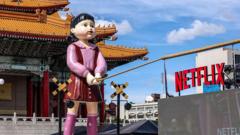The final season of Squid Game not only entertains but sparks important conversations about the harsh realities faced by many South Koreans today.
### Squid Game Bows Out: South Koreans Reflect on its Reality

### Squid Game Bows Out: South Koreans Reflect on its Reality
As the hit series concludes, viewers grapple with its dark portrayal of societal pressures in South Korea.
In an emotional culmination, millions across the globe are saying goodbye to "Squid Game," the groundbreaking series that achieved Emmy acclaim and took Netflix by storm. Set against the backdrop of South Korea’s competitive spirit, the show narrates a harrowing tale where financially desperate participants compete in deadly versions of childhood games. The recently released final season has reignited discussions reflecting the struggles inherent in South Korean life.
South Korea finds itself in the wake of the series' popularity, with many locals contemplating the societal structures that fueled its creation. Comments on social media highlight the show's profound realism: "Squid Game portrays the raw sentiments of Koreans," claimed one viewer, noting the brutal work culture that resonates with the populace. The series dives into the lives of relatable figures, from factory workers to digital fraudsters, mirroring the real-life challenges faced by many in a society marked by economic disparity.
Anchored in the real-life 2009 labor standoff at SsangYong Motor, where laid-off workers clashed with law enforcement, the series’ protagonist Seong Gi-hun’s journey is rooted in lived experience. Reviewers echo this sentiment, stating, "The drama accurately encapsulates the very issues of precarious employment and fractured families we endure daily."
In celebration of the show's finale, a vibrant parade unfolded in Seoul, featuring a gigantic version of the show’s ominous doll, reflecting a juxtaposition of the series' grim themes with public enthusiasm. Leaders of South Korea have leveraged the series’ success as emblematic of K-culture’s international triumph, with President Lee Jae Myung keen to promote this artistic wave alongside other notable franchises like BTS and "Parasite."
The series concluded on an ambiguous note, with actor Lee Jung-jae highlighting how it leaves audiences pondering moral dilemmas and societal questions. As viewers critique Gi-hun's final act to save a fellow competitor's child—some seeing it as a departure from the show's brutal honesty—others appreciate the nuanced portrayal of humanity's duality.
Creator Hwang Dong-hyuk acknowledged the mixed receptions of the finale, noting the heightened expectations with subsequent seasons. While some viewers yearned for more intense competition, others focused on character depth and thematic heaviness, creating a diverse tapestry of viewer opinions.
Amidst these discussions, some viewers found solace in Gi-hun's choice, seeing it as a beacon of kindness in a world rife with hardship. "The series encapsulates coexisting cruelty and compassion," asserted film blogger Jeong, reflecting on personal transformations through the storytelling. Ultimately, "Squid Game" ends not just as a show but as a cultural moment, prompting reflection on kindness amid adversity.
South Korea finds itself in the wake of the series' popularity, with many locals contemplating the societal structures that fueled its creation. Comments on social media highlight the show's profound realism: "Squid Game portrays the raw sentiments of Koreans," claimed one viewer, noting the brutal work culture that resonates with the populace. The series dives into the lives of relatable figures, from factory workers to digital fraudsters, mirroring the real-life challenges faced by many in a society marked by economic disparity.
Anchored in the real-life 2009 labor standoff at SsangYong Motor, where laid-off workers clashed with law enforcement, the series’ protagonist Seong Gi-hun’s journey is rooted in lived experience. Reviewers echo this sentiment, stating, "The drama accurately encapsulates the very issues of precarious employment and fractured families we endure daily."
In celebration of the show's finale, a vibrant parade unfolded in Seoul, featuring a gigantic version of the show’s ominous doll, reflecting a juxtaposition of the series' grim themes with public enthusiasm. Leaders of South Korea have leveraged the series’ success as emblematic of K-culture’s international triumph, with President Lee Jae Myung keen to promote this artistic wave alongside other notable franchises like BTS and "Parasite."
The series concluded on an ambiguous note, with actor Lee Jung-jae highlighting how it leaves audiences pondering moral dilemmas and societal questions. As viewers critique Gi-hun's final act to save a fellow competitor's child—some seeing it as a departure from the show's brutal honesty—others appreciate the nuanced portrayal of humanity's duality.
Creator Hwang Dong-hyuk acknowledged the mixed receptions of the finale, noting the heightened expectations with subsequent seasons. While some viewers yearned for more intense competition, others focused on character depth and thematic heaviness, creating a diverse tapestry of viewer opinions.
Amidst these discussions, some viewers found solace in Gi-hun's choice, seeing it as a beacon of kindness in a world rife with hardship. "The series encapsulates coexisting cruelty and compassion," asserted film blogger Jeong, reflecting on personal transformations through the storytelling. Ultimately, "Squid Game" ends not just as a show but as a cultural moment, prompting reflection on kindness amid adversity.





















